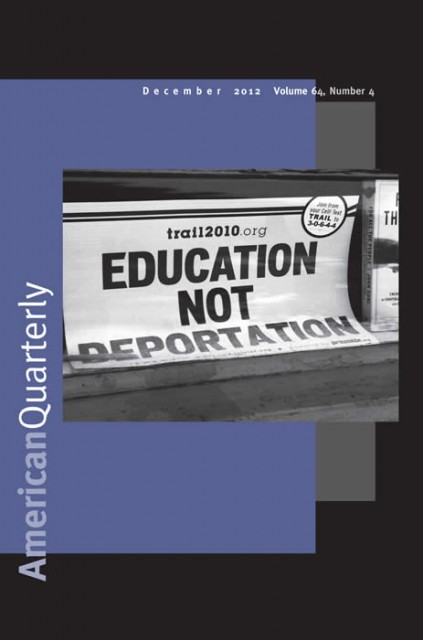Activism and Academia: Contradictory Spaces?
Many of the remarks above gesture to the complications of working in the 'third space' between activism and academia, not least because the academy is traditionally suspicious of highly engaged, participatory, and transparently ethico politically 'committed' inquiry, but also sometimes because activists are (often justifiably) suspicious of what these academics are 'really' after (ultimately career boosting or wishing to make a 'real' contribution?). Pursuing activist methodologies may entail problems and privations on behalf of (young) academics, for example, through delays in promotion, or failure to gain tenure, and such difficulties may be particularly acute within the increasingly neoliberal university system. However, being actively involved outside of the academy in order to effect some form of social change can be both a rewarding personal experience as well as bringing potential insights into one's academic work. There are many examples of geographers who have become involved, in different ways, ethico politically, and who have discussed the hazards and potentials of such engagement; notably the contributors to the 'Research, action and 'critical' geogaphies' theme issue of Area in 1999 and the recent e volume edited by Fuller and Kitchin (mentioned earlier).

Activist desires sit in an uneasy relationship to that academic desire to conduct research and to be published. The activist and the academic are usually identities performed on different stages and for different audiences, which necessitates a careful negotiation of the different powers at work in the collaboration process – 'our' own power as activist academics, the entangled relations of power between us and our collaborators, and the limitations, possibilities, and deployments of these various powers. Within these entangled powers the importance of reflexivity cannot be underestimated, since we miss an important dimension of self reflexivity if we neglect to examine our own capacity to facilitate change in the lives of others in addition to merely representing them. Although critical collaboration enables academics potentially to play a greater role in effecting social change, the entangled powers that are entailed sit uneasily together, and thus we need to acknowledge an embodied politics that is committed, yet partial in perspective. Creating common ground with resisting others serves to highlight and 'ground' differences (in language, ethnicity, power, access to resources, etc.) in particular ways in particular places. When placed in such active proximity, difference (in ways of being, talking, and acting) can be both recognized and negotiated.
Activist geographic praxis acknowledges the importance of letting myriad flowers bloom in the academic imagination, while recognizing the importance of tempering the privilege of academics to pursue personal research agendas with an ethics of political responsibility to resisting others. Such responsibility extends beyond teaching within the academy (to relatively privileged students), in order for academic research to ''make its deliberations more consequential for the poorer eighty per cent of the population of the world'' (Appadurai, 2000: 3). Activist geographies are concerned with grounding our theories and imaginations in the messy unpredictability of everyday life, and embodying radicalism that situates the geographical and academic imagination within the key political debates and actions of our time – thereby always politicizing the personal. For example, we might be actively resisting rather than bemoaning or complying with the neoliberal restructuring of academia; or we might be practically living alternative geographical possibilities in addition to theorizing about the radicalizing of geography to engage actively with 'the wretched of the Earth'. In particular, activist geographies can contribute to the creation of new political spaces and potentially new forms of collaborative power. Myriad forms of engagement are possible: as activist academics, we can reclaim streets, blockade military bases, and barricade corporate offices; occupy land, warehouses, and unoccupied houses; use our skills in popular health and education outreach; participate in social centers, infoshops, guerrilla gardens, and independent media initiatives; culture jam and decommodify corporate private space; contribute to direct democracy and autonomist experiments in everyday living through practising consensus based politics; engage in the long term work of contributing to, and constructing, socially just and environmentally sustainable communities. Ultimately, activist geographies prioritizes grounded, embodied political action, the role of theory here being to contribute to, be informed by, and be grounded in such action, in order to create and nurture mutual solidarity and collective action, a liberatory politics of affinity.
- Responsible Activist Geographies
- Activist Methodologies, Collaborations, and Everyday Life
- Toward More Fully Activist Geographies
- Activist Geographies
- Geographies of Activism Types and Catalysts of Activism
- Network Geographies
- Moves into Geography – Bypassing Dualisms
- Actor-Network Theory
- Activist Geographies – Introduction